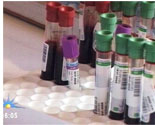HHS Secretary Announces
Funding to Combat AIDS in Russia
By Roch Hammond
July 02, 2004 (CNSNews.com Correspondent)
(CNSNews.com) - Health and Human Services Secretary Tommy Thompson, on a
visit to Moscow this week, announced a $34-million grant to help treat and
care for Russian people living with HIV/AIDS and tuberculosis.
The grant money, from the Global Fund to Fight AIDS, Tuberculosis and
Malaria, will be dispersed over a five-year period. The Global Fund only finances programs when it is assured that its
assistance does not replace or reduce other sources of funding, either those
for the fight against AIDS, tuberculosis and malaria or those that support
public health more broadly, its website states.
period. The Global Fund only finances programs when it is assured that its
assistance does not replace or reduce other sources of funding, either those
for the fight against AIDS, tuberculosis and malaria or those that support
public health more broadly, its website states.
Official government estimates indicate that there are more than 274,000
people living with HIV/AIDS in Russia, although many health experts believe
the actual number is much higher - in the 1.5- to 2-million range.
According to HHS estimates, nearly 60 million people worldwide have been
diagnosed with HIV/AIDS. In Africa alone, 30 million people have been
stricken with the deadly virus.
This week, the Global Fund Board voted to award $968 million to 50 nations.
The Global Fund has committed more than $3 billion to 130 countries and
three territories since its inception in 2002.
"The Global Fund is a major part of the United States' commitment to being
the world leader in providing compassionate care for people living with
AIDS," Thompson said. "As a nation, we are dedicating unprecedented
resources, time and energy into research, treatment and prevention of
HIV/AIDS."
Liberal groups, homosexual advocacy organizations, and others have
disparaged the Bush administration's approach to fighting HIV/AIDS.
The Center for American Progress, a liberal group dedicated to finding
"progressive and pragmatic solutions to significant domestic and
international problems," claims on its website that the Bush administration
has a "go-it-alone" approach to fighting HIV/AIDS that has led it to neglect
international efforts and seek inadequate solutions to the crisis, such as
abstinence-only sex education.
The group also asserts that President Bush has underfunded his own
initiative.
The Human Rights Campaign, which describes itself as the nation's largest
"gay, lesbian, bisexual and transgender advocacy organization," has been an
outspoken critic of the Bush administration's HIV/AIDS initiative.
HRC's website argues that America's response to the HIV/AIDS epidemic must
be "comprehensive in nature -- including appropriate resources for
prevention, research, housing and care and treatment."
HRC highlights domestic programs aimed to ease the suffering of those living
with HIV/AIDS such as the Ryan White CARE Act passed in 1990, prevention
programs at the Centers for Disease Control and Prevention, research at the
National Institutes of Health and the Housing Opportunities for People with
AIDS program at the Department of Housing and Urban Development.
HRC is also a member of the federal AIDS Partnership, which compiles a
"comprehensive list of federal programs and identified needs."
Under President Bush, the United States is the largest donor to the Global
Fund, pledging nearly $2 billion of the $5.4 billion pledged by all nations,
corporations, individuals and charitable foundations to date.
The 2005 fiscal year budget of President Bush requests $2.7 billion for
international AIDS programs, a 272 percent increase over the $725.6 million
spent by the United States in fiscal year 2001.
The $2.7 billion is one facet of President Bush's Emergency Plan for AIDS
Relief.
The plan is a five-year, $15 billion initiative to combat the HIV/AIDS
crisis throughout the world. Total federal spending on domestic and
international HIV/AIDS programs has grown from $14.2 billion in fiscal year
2001 to a requested $19.8 billion in fiscal year 2005-a 40 percent increase
under the Bush administration.
Calls to the Center for American Progress, the Human Rights Campaign and
International AIDS Trust were not returned at press time.